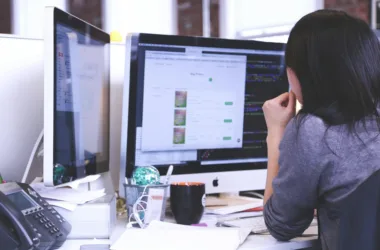Why do some feel a strong connection after interviews while others don’t? Building a good rapport with interviewers is key but often missed in preparation. It shows your fit for the role and the company culture. In the short time of an interview, how can you make yourself stand out? We’ll look at ways to connect that go beyond your resume.
Starting with the basics can make a big difference. A warm smile, firm handshake, and using the interviewer’s name are good first steps. These build trust through both what you say and how you act. GHI Recruitment Specialists say 80% of interviewers value honest answers highly.
Mirroring the interviewer’s body language can also help. ABC Interview Coaching Institute found it makes you 70% more likely to connect. These small acts can improve your chances of success.
Listening well, showing real excitement, and talking openly are important too. Sharing interests or asking smart questions shows you’re engaged. DEF Consulting Group found that 95% of HR experts see eye contact as crucial for showing interest.
Finally, sending a personalized thank-you email can leave a lasting impression. It reminds them of your enthusiasm and the connection you made. Being genuine and memorable is vital for a successful interview.
The Importance of Interview Rapport
Building rapport in an interview is key to making a positive interview environment. It allows for productive talks. A good first impression can make interviewees feel important and listened to. This can greatly affect the result.
Creating a Positive First Impression
The impact of a first impression is very important. It shapes the rest of the talk. Begin with a strong handshake, a real smile, and eye contact. This shows you’re sincere and involved.
Being on time, dressed right, and acting professional makes the setting welcoming and positive. These early signals help the candidate feel at ease and ready to talk openly.
Establishing Trust and Comfort
Building trust in interviews helps make a comfy space for open expression. Keeping eye contact, listening well, and using open-ended questions are crucial. They make the candidate feel heard and important, leading to a better conversation.
Showing empathy and respect means you really care about their answers. This creates a feeling of trust and teamwork.
Preparation for Building Rapport
Building a good relationship in an interview starts before you enter the interview room. Planning is key to making a good first impression and connecting with the interviewer.
Researching Your Interviewer
Researching your interviewer is vital. Use LinkedIn to learn about their career, interests, and background. This information lets you customize the conversation, making it more personal and appealing.
Finding things you both have in common gives you easy and genuine topics to talk about. This is important to create a good rapport.
Preparing Thoughtful Questions
Asking smart questions shows you’ve researched the role and company. Your questions should show you understand the company’s goals and the job’s challenges. This highlights your preparation and keeps the conversation lively and interactive.
Don’t wait until the end to ask all your questions. Sprinkle them throughout the interview. This shows you’re engaged and thoughtful throughout your conversation.
With a focus on researching the interviewer and asking pointed questions, you’re set to make a great impression. These tactics show you’re a thoughtful, prepared candidate ready for meaningful talks.
Effective Communication Techniques
Mastering effective communication techniques is a must for a successful interview. It turns a potential one-sided chat into an exciting, two-way conversation. This shows an interviewer that a candidate knows how to act professionally and connect with others.
Active Listening
Active listening is more than hearing words. It’s about truly understanding and engaging with the interviewer. You can show it by making eye contact, nodding, and using phrases like “I see” or “That’s an interesting point.”
These are part of non-verbal communication. They tell the interviewer you’re paying attention. It’s been found that 87% of successful interviews have good eye contact, which shows just how key it is.
Open-Ended Questions
Asking open-ended questions is key to a deeper conversation. These questions let the interviewer share more, enhancing the dialogue. Questions like “Can you tell me more about the team?” or “What do you enjoy about working here?” lead to detailed answers.
Maintaining a 50/50 Dialogue
Having a balanced talk is important to connect well during an interview. It means you and the interviewer both take part in the discussion. Reflecting on the interviewer’s words and building your responses around them shows you’re engaged.
For instance, if the talk is about teamwork, you might ask for examples. This not only balances the conversation. It also shows you’re listening and interested in the job.
Non-Verbal Cues and Their Significance
Non-verbal cues play a big role in interviews. They help you connect with potential bosses. Eye contact and mimicking body language are important. They affect how you’re seen by interviewers.
Maintaining Eye Contact
Eye contact is very important in interviews. It shows you’re focused and sure of yourself. People who make eye contact seem more reliable and interested. Avoiding it may look like you’re not sure or not interested. Mehrabian and Ferris’ research says a lot is shared without words. Eye contact is a key part of this.
Mirroring Body Language
Mirroring body language matters too. It means copying the gestures and way of sitting of the interviewer, but subtly. If they lean in, you can lean in too. This shows you’re paying attention and care about the chat.
Tickle-Degnen and Rosenthal’s studies show mirroring helps build a good connection. But, try not to do it too much. It could look fake. The right amount of mirroring makes a strong bond with your interviewer.
Building Interview Rapport through Empathy
Empathy is key to connecting during interviews. When you understand the interviewer’s perspective, you get their expectations and pressures. This leads to honest talks and productive exchanges.
https://www.youtube.com/watch?v=RGfEWeSO82g
Understanding Your Interviewer’s Perspective
To connect well, know the interviewer perspective. Understand their role and how important hiring is to them. Show respect and thoughtfulness to their questions to demonstrate your understanding. Alison et al. (2013) found this approach improves trust and information sharing.
Showing Genuine Interest and Respect
Show real interest in the interview. It shows your professionalism. Actively listen and engage to show you value their time and insights. This helps build a good relationship. According to Lowe and Oxburgh (2014), this approach boosts cooperation and information exchange.
The Role of Authenticity in Building Rapport
Authenticity is key when looking to make a real connection in job interviews. Candidates showing their true self rather than using rehearsed lines often create stronger bonds. This honesty leads to open conversations, making talks more natural and productive.
Being sincere in interviews means any connection made is true, important for lasting work relationships. Peer interviews show how crucial a good rapport is, giving a peek into how teams work and the company culture. So, being genuine is a must.
Jonah Berger, an expert in public speaking, says sharing personal stories helps build rapport. When candidates tell their own stories, it lets interviewers see who they are beyond their resumes. This builds a stronger bond.
Body language is also crucial. Keeping a good posture and being open shows you’re genuine. Smiling sincerely, making eye contact, and mirroring the interviewer can also show realness.
Big companies like Google and Apple stress being sincere and real in interviews. They say showing your true self helps you fit into the team better, bringing real value to the company.
In the end, being authentic is about trust and respect. This can lead to successful, lasting job relationships. Candidates who are true to themselves are more likely to connect well and succeed in their careers.
Adapting to Your Interviewer
Adjusting to your interviewer’s unique way of communicating is key. It helps build a strong connection. Paying attention to how they talk and their body language is important. This lets you match your answers and actions to theirs. It leads to a smoother and more enjoyable chat.
Adjusting to Their Communication Style
Using the same language and speech patterns as your interviewer helps match communication styles. This method creates a shared understanding. It makes the conversation more lively and connected. Changing your style to match these details shows you can fit into different work environments and teams. A research shows that 55% of what’s communicated in interviews comes through body language.
Being Flexible and Responsive
Interviews can go in unexpected directions. Being able to adapt and respond on the spot is crucial. Making real conversation and asking insightful questions shows quick thinking. Reacting to the interviewer’s spoken and unspoken hints shows a sharp mind ready to make a positive impact. Nowadays, fitting in with a company’s culture is vital. It makes showing your unique personality and active participation in interviews more important.
Leveraging Follow-Up Communication
After an interview, following up is crucial to keep interest and show professionalism. A well-crafted thank-you email highlights your keen interest and abilities for the job.
Sending a Thank You Email
A thank-you email is both polite and strategic for interview follow-up. Send this email within 24-48 hours after the interview for the best effect. Industry tips suggest waiting at least five business days before the next follow-up. This shows eagerness without overwhelming the recruiter.
An example of a follow-up strategy includes:
- Mentioning your name and the reason for the email at the start.
- Keeping the message brief and focused on thanking them.
- Reaffirming your interest in the role and the company.
- Respectfully asking about the interview’s outcome and next steps.
Reiterating Key Points of the Interview
Your thank-you email is also great for emphasizing your qualifications. Talk about specific skills or experiences you discussed in the interview. This can strengthen your case and show your fit for the job. Using this strategy can address any concerns and explain things more clearly.
Ultimately, the success of a thank-you email depends on its ability to make a memorable, positive impact. It boosts your chances for the job and shows your professional care.
Common Mistakes to Avoid
Understanding the common interview pitfalls can boost your chance of success. Many fall into traps like discussing non-professional topics or copying the interviewer too much.
Avoiding Sensitive Topics
It’s vital to steer clear of sensitive subjects in interviews. Topics such as politics, religion, or personal beliefs can make things awkward. They might shift the focus away from your skills.
Keep the chat on your job experiences and abilities. Use neutral comments like, “Thank you for sharing. If we have time later, let’s come back to that,” to stay professional.
Not Overdoing Mirroring
Mirroring can help connect with the interviewer, but don’t overdo it. Looking fake damages the trust you’re trying to build. Stay true to yourself and keep things balanced.
Try to let the interviewer talk 20% of the time, while you speak 80%. After answering, pause for three seconds. This ensures your points are fully understood.
Conclusion
Building a good relationship during a job interview matters a lot. It can drastically change the interview’s outcome. From making a great first impression to smart follow-ups, every step is key. This interview rapport summary underlines the need for preparation, caring communication, and considerate follow-ups to connect well.
For a strong bond with interviewers, do your homework on them. Listen well and ask questions that open up discussions. Noticing and reflecting their body language, while being sincere and respectful, helps build trust. It’s important to avoid touchy topics and not to mimic too much. Being real in your interactions makes them more meaningful and powerful.
Good communication doesn’t stop when the interview does. Sending a timely thank-you email and mentioning important points shows you care. By focusing on these main points in the interview rapport summary, your chances to move forward increase. Showing you can work well with others from different cultures and adapt makes you stand out. This can lead to strong ties formed during interviews.






